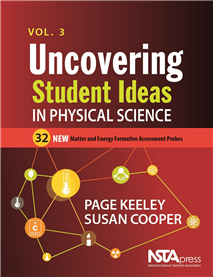All Book Chapters
Book Chapter
In this session, students engage in a mock scientific conference to demonstrate another aspect of the work of scientists—sharing work with peers and seeking critical review. The mock conference provides an opportunity for students to present their ...
Book Chapter
This session provides an opportunity for students to integrate the information they have learned from their research. They create charts or mind maps to anticipate the ripple effects from an aspect they have studied. They consider the secondary effec...
Book Chapter
This session is about hope. After students learned a great deal about the serious implications of a warming planet, it is important for them to have reasons to be hopeful and to see solutions that are being implemented and planned for the sustainabil...
Book Chapter
This session brings together all that students have learned to provide them with concrete actions they can take to make a difference in their own lives and communities. The session begins with students calculating their own carbon footprint and compa...
Book Chapter
The purpose of this assessment probe is to elicit students’ ideas about the concept of matter. It is designed to understand how students define matter and whether they recognize that all living, once-living, and nonliving things, materials, or subs...
Book Chapter
The purpose of this assessment probe is to elicit students’ ideas about the concept of matter. It is designed to find out how students define matter and whether they recognize that all three states—solids, liquids, and gases—are matter. It is b...
Book Chapter
What Do You Know About Atoms and Molecules?
The purpose of this assessment probe is to elicit students’ ideas about atoms and molecules. It is designed to reveal commonly held ideas students have about the structure and properties and provides students an opportunity to use the scientific p...
Book Chapter
The purpose of this assessment probe is to elicit students’ ideas about the size (in diameter) of atoms. It is designed to reveal how students use the crosscutting concept of scale to compare relative sizes by estimating size in general and using o...
Book Chapter
The purpose of this assessment probe is to elicit students’ ideas about the particle model of matter. The probe is designed to find out if students recognize that air is made up of particles that are widely spaced with empty space between the parti...
Book Chapter
What If You Could Remove All the Atoms?
The purpose of this assessment probe is to elicit students’ ideas about the particle model of matter. The probe is designed to find out if students recognize that there is empty space between the atoms that make up an object and that the atoms are ...
Book Chapter
Do They Have Weight and Take Up Space?
The purpose of this assessment probe is to elicit students’ ideas about extensive properties. It is designed to determine whether students recognize that weight (or mass) and volume are extensive properties of the three familiar states of matter. T...
Book Chapter
What Does “Conservation of Matter” Mean?
The purpose of this assessment probe is to elicit students’ ideas about the phrase conservation of matter. It is designed to find out how students interpret the word conservation in the context of matter. The probe is best used with grades 5–12. ...
Book Chapter
The purpose of this assessment probe is to elicit students’ ideas about the conservation of matter. The probe is designed to find out if students conserve matter when salt is dissolved in water. It is best used with students in grades 3–12, with ...
Book Chapter
The purpose of this assessment probe is to elicit students’ ideas about density. The probe is designed to find out whether students recognize a change in the mass-volume ratio when the volume changes and the mass stays the same. It is best used wit...
Book Chapter
The purpose of this assessment probe is to elicit students’ ideas about density. It is designed to find out whether students have commonly held ideas about mass, volume, shape, and other properties that interfere with their conceptual understanding...



